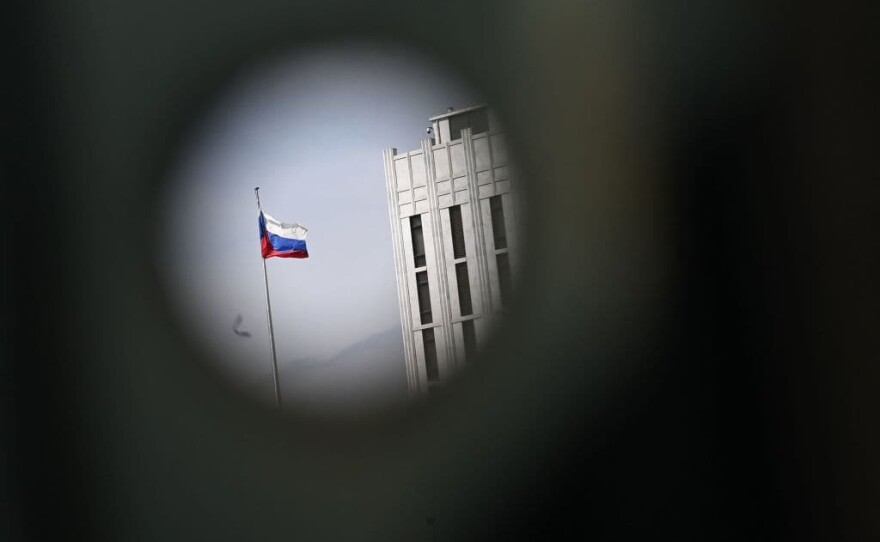Sign up for the On Point newsletter here.
The international community responded to Russia’s invasion of Ukraine with harsh sanctions. But a year later, Russia is still fighting in Ukraine.
“You can try to sanction Putin and his oligarch cronies, but there’s no way that you’re going to bankrupt them,” Eddie Fishman says.
So are sanctions working?
“If the only evidence of it working would be if Russia had retreated to their barracks, then of course, the answer is the sanctions haven’t worked,” Adam Smith says.
Today, On Point: What have the Russia sanctions achieved?
Guests
Adam Smith, he runs the sanctions practice for the law firm Gibson, Dunn & Crutcher. Former senior adviser at the Treasury Department’s Office of Foreign Assets Control (OFAC), which enforces sanctions.
Frank Vogl, co-founder of Transparency International, Chair of the Partnership for Transparency and a professor of government at Georgetown University. Author of The Enablers: How the West Supports Kleptocrats and Corruption, Endangering Our Democracy. (@frankvogl)
Sergey Aleksashenko, former Russian deputy finance minister and first deputy chairman of the Russian Central Bank. (@Saleksashenko)
Also Featured
Edward Fishman, professor at Columbia University and former State Department official who worked on Russia and Iran sanctions. (@edwardfishman)
Interview Highlights
On the international community’s goals for the sanctions
Adam Smith: “I think they’ve changed, to be honest. I do think that to start with a President Biden and the alliance were really trying to have the sanctions be a deterrent. When that proved to be unsuccessful, I think they did pivot, and they pivoted to a couple of ideas that I think continue to this day. The first, I think, is to degrade Russia’s ability to continue fighting the war on the terms it would like.
“Limiting the ability to digitize its military, recoup its losses, etc. So that’s sort of the actual economic and physical goods sort of restrictions into Russia. And then perhaps even more importantly, is a messaging one. When parties are sanctioned, especially by such a global multilateral approach, there is a message that what they are doing is outside the norm and really beyond the pale. So, I think a combination of actual degradation of abilities combined with the messaging that what they’re doing is completely inappropriate.”
Frank Vogl: “Deterrence, before the invasion started, was clearly a very important factor. But it was also important as a mechanism to build the coalition that President Biden was so interested in doing. And many countries might not have been able to agree at that time on military cooperation and so forth. But agreeing on the economic sanctions in the event of a Russian invasion was a very useful mechanism to get that sort of coalition-building going.
“The second point I would make is that the sanctions come in two fundamental different forms. One is sanctions on the Russian economy, and on the Russian state. And the second type of sanctions are sanctions on individuals. All the members of the Russian parliament, the Duma, have been sanctioned. Many businessmen have been sanctioned. Many people in the Kremlin individually have been sanctioned. And the purpose there is to place increasing pressure on the Kremlin to force an end to the aggression, by making life really tough for all the individuals sanctioned. The hope is that they, in turn, will influence President Putin to relent and change policy.”
Have sanctions ever worked as a method of deterrence?
Adam Smith: “When I was still in the government and working on the first round of Russia sanctions after the Crimea invasion in 2014, there were Ukrainians and there were sanctions then, not nearly as comprehensive as they are today. There were Ukrainians at the time after 2014 who sort of said, well, the sanctions aren’t working. Because Russia is still in Crimea, which is where they were at the time.
“However, there were other Ukrainians who would tell me that, in fact, the sanctions did work because if not for them, Russia would have already been in Kyiv or Lvov or elsewhere. So it forces this sort of interesting counter historical. I mean, there are cases, I would argue, if not of deterrence, of certainly compulsion, where sanctions, for example, brought Iran to the table with the nuclear talks … five to ten years ago at this stage.
“You know, there are cases with the apartheid cases with Libya, cases with the former Yugoslavia, where sanctions have changed the calculus of those in charge in a way that supported the policy interests for which the sanctions were imposed. But deterrence is a very challenging sort of assessment because you’re always trying to prove that which did not happen, or that which happened, but might have happened differently.”
This article was originally published on WBUR.org.
Copyright 2023 NPR. To see more, visit https://www.npr.org. 9(MDM3NjYwMjA5MDE1MjA1MzQ1NDk1N2ZmZQ004))


